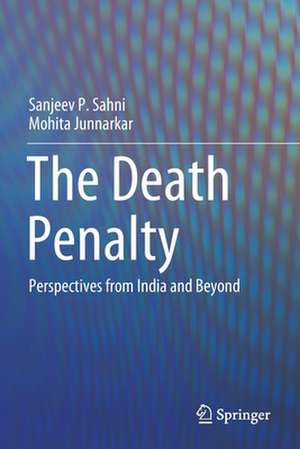The Death Penalty: Perspectives from India and Beyond
Autor Sanjeev P. Sahni, Mohita Junnarkaren Limba Engleză Paperback – 15 mar 2021
| Toate formatele și edițiile | Preț | Express |
|---|---|---|
| Paperback (1) | 380.63 lei 6-8 săpt. | |
| Springer Nature Singapore – 15 mar 2021 | 380.63 lei 6-8 săpt. | |
| Hardback (1) | 387.75 lei 6-8 săpt. | |
| Springer Nature Singapore – 15 mar 2020 | 387.75 lei 6-8 săpt. |
Preț: 380.63 lei
Nou
Puncte Express: 571
Preț estimativ în valută:
72.84€ • 79.10$ • 61.19£
72.84€ • 79.10$ • 61.19£
Carte tipărită la comandă
Livrare economică 23 aprilie-07 mai
Preluare comenzi: 021 569.72.76
Specificații
ISBN-13: 9789811531316
ISBN-10: 9811531315
Pagini: 127
Ilustrații: XXXIII, 127 p. 46 illus., 43 illus. in color.
Dimensiuni: 155 x 235 mm
Greutate: 0.24 kg
Ediția:1st ed. 2020
Editura: Springer Nature Singapore
Colecția Springer
Locul publicării:Singapore, Singapore
ISBN-10: 9811531315
Pagini: 127
Ilustrații: XXXIII, 127 p. 46 illus., 43 illus. in color.
Dimensiuni: 155 x 235 mm
Greutate: 0.24 kg
Ediția:1st ed. 2020
Editura: Springer Nature Singapore
Colecția Springer
Locul publicării:Singapore, Singapore
Cuprins
1. Death Penalty: A Global Context.- 2. Death Penalty: An Indian Context.- 3. Non-State Actors Perspectives on Death Penalty.- 4. Public Opinion Polls on Death Penalty.- 5. Psychosocial Factors Associated with Death Penalty: Convicts and Families of Convicts.- 6. Public Opinion Poll: Indian Study Way Forward
Notă biografică
Prof. (Dr.) Sanjeev P. Sahni is a Professor and the Principal Director of the Jindal Institute of Behavioural Sciences (JIBS), Director of the Centre for Victimology and Psychological Studies, Centre for Leadership and Change, and Centre for Community Mental Health; Member of the Governing Body; and Advisor to the Vice Chancellor at O. P. Jindal Global University. He holds a Ph.D. degree in Organisational Behaviour. He has 32 years of experience in academia, industry, and the government sector in fields such as organisational behaviour, criminal psychology, cognitive psychology, and neuropsychology. He has trained over 32000 school principals and teachers, senior government officials and industry professionals in over 50 countries. He served as a scientist at the Ministry of Human Resource Development and Sports Authority of India for 14 years, before moving to Human Resources at the Jindal Group. He has worked as a Research Scientist at several universities, such as the University ofHouston, Texas; and the University of Illinois, Chicago. Dr. Sahni has received several awards and has recently been nominated as a member of the board of directors of the International Society of Criminology. He has published more than 30 research articles in international and national indexed journals and about 20 book chapters. He has also written 14 Books, including Internet Infidelity (Springer), Digital Piracy in the Digital Era (Springer), Behavioral Competency (Bloomsbury), Compensation and Benefits (Bloomsbury), and Conflict: The Police and The People (Lexis Nexis). Dr. Mohita Junnarkar is currently working as an Assistant Professor and Deputy Director at Jindal Institute of Behavioural Sciences, O. P. Jindal Global University. She has 6 years of research and teaching experience, and her areas of interest are applied positive psychology, psychometrics, cognitive psychology and adolescents. Mohita Junnarkar has published 16 papers in peer-reviewed international and national journals, 3 books, and 8 book chapters. She has also presented 15 papers at national and international conferences. She has taught courses in cognitive and positive psychology and psychometrics and various public and private universities. She is also one of the founding members of National Positive Psychology Association and is a reviewer for the Journal of the Indian Academy of Applied Psychology.
Textul de pe ultima copertă
This book offers a broad overview of public attitudes to the death penalty in India. It examines in detail the progress made by international organizations worldwide in their efforts to abolish the death penalty and provides statistics from various countries that have already abolished it. The book focuses on four main aspects: the excessive cost and poor use of funds; wrongful executions of innocent people; the death penalty’s failure as an efficient deterrent; and the alternative sentence of life imprisonment without parole. In closing, the book analyses the current debates on capital punishment around the globe and in the Indian context. Based on public opinion surveys, the book is essential reading for all those interested in India, its government, criminal justice system, and policies on the death penalty and human rights.
Caracteristici
Is the first book to cover the views of a vast number of experts on the death penalty Examines the current debate on capital punishment around the globe and in India Discusses the psychosocial factors associated with the death penalty
